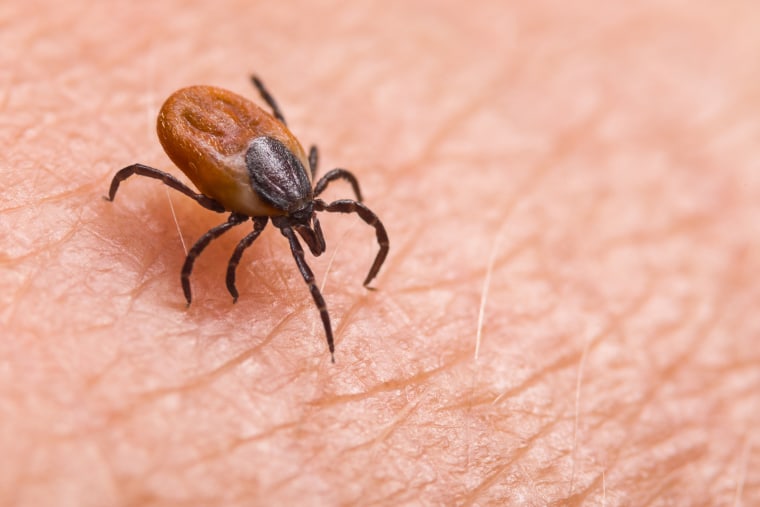While most bugs die in the winter, ticks are relatively impervious to the freezing temperatures — and as the climate warms, they are becoming increasingly active in winter months, experts warn.
The pestiferous little bloodsuckers just hunker down on cold days and wait for the temps to temporarily rise and then they’re out and about waiting for an opportunity to hop on you and your precious pets.
Winters used to be more consistently cold, said Rafal Tokarz, an epidemiologist at the Center for Infection and Immunity at the Columbia University Mailman School of Public Health.
“Now we have stretches of abnormally warm weather and they come out more frequently,” he said.
At the same time, with nicer winter days, people go out more for walks with their dogs or families.
“The ticks will be there,” Tokarz said. “This contributes to the number of cases of Lyme in the wintertime.”
In fact, emergency room visits for tick bites, which had been declining since the summer peak, are rising in some parts of the United States, especially in the Northeast, according to recent data from the Centers for Disease Control and Prevention.
While tick bites are expected to decline as freezing temperatures hit, climate change is making matters worse.
The government released the new National Climate Assessment report Tuesday, with the prediction that most areas of the U.S. will get warmer.
“So the risk of an adult tick finding us in the winter will get higher,” said Richard Ostfeld, a tick expert at the Cary Institute of Ecosystem Studies in Millbrook, New York.

Ticks that spread Lyme disease can last through the entire winter, he said. “When it warms in March and April, you’ll see a second wave of activity” among ticks that hadn’t yet found someone to bite, he added.
This also applies to other ticks we have to worry about in the U.S., such as lone star ticks and dog ticks, Ostfeld said. Both of those ticks can infect people with Rocky Mountain spotted fever.
That means people need to worry all year about Lyme disease, which is spread by the bite of a black-legged tick, experts say. Lyme disease is the most common tick-borne illness in the U.S., with anywhere from 30,000 up to 500,000 cases each year.
The warming temperatures due to climate change have also resulted in ticks spreading into new geographical areas.
When winter comes and temperatures drop, the adult ticks that started to appear in the fall “get nice and comfortable under leaf litter,” said Laura Goodman, an infectious disease researcher in the department of public and ecosystem health at Cornell University.
“Depending on how well insulated they are, they can be perfectly fine,” she said. “As soon as it gets warmer or a little sunny, they pop back out again.”
Latest on tick-borne illnesses
People need to be aware that even if the overall temperature is low, there can be spots where it feels warmer, Goodman said. “Thinking about the general forecast is not that helpful in this situation.”
Ticks are a lot more resilient than you might think, she said. “We have put them in the freezer in the lab and then taken them out and they are still alive. They have to be frozen and dried to die.”
Ticks have a three-stage lifecycle, and in each stage, they take just one “blood meal,” Tokarz said.
The first stage, the larval stage, isn’t worrisome because the ticks haven’t picked up the bacterium that causes Lyme disease, officially known as Borrelia burgdorferi. The larvae become infected when they bite a mouse infected with the bacteria.
When they become nymphs, their next stage, infected ticks can pass on the disease to humans, their pets and other animals, which also may be carrying the bacteria.
By the time ticks become adults, they will have had two opportunities to pick up Borrelia burgdorferi: from infected mice in their larval stage and from infected animals, often deer, in their nymph stage.
Ticks in the nymph stage can be hard to detect because they are about the size of a poppy seed, experts say. Adults are far larger and much easier to spot.
Topaz’s tick studies on Long Island, New York, revealed that about 15% to 20% of nymphs carried the bacteria, while some 60% to 75% of adults carried it.
So, the bad news is that if someone is bitten by an adult tick in winter, there’s a much greater chance it will be infected and pass on the bacteria than a nymph would in the spring and early summer.
The good news is because the adult ticks are so much larger, they are easier to detect and remove before they’ve passed on the disease-causing bacteria.
“Provided you remove the tick promptly, the chances of infection go down dramatically,” Tokarz said.
While most Lyme cases are reported in the spring and summer, there are reports every month, he said.
How to avoid tick bites in colder weather
Experts suggest several measures that people can take to avoid getting Lyme in the winter months:
- When you come in from a hike, or anywhere else you might have picked up a tick, carefully check yourself.
- Use insect repellent.
- Wear lighter clothing if you go on a hike so that any ticks can be easily spotted.
- If there’s any chance you might have picked up a tick, throw your clothes in the dryer before the washer because the dry heat will kill it.
If you find a tick attached to your skin, but don’t ever develop a rash, don’t assume you don’t have Lyme. Testing for Lyme can be complicated but the CDC recommends using a combination of antibody tests, including an immunoassay antibody test like ELISA followed by an immunoblot antibody test like the western blot test.
When it comes to pets, there are also measures you can take to protect them, including a Lyme vaccine for dogs, and liquids for cats and dogs that can be put on the animal’s neck or pills that can be given to protect them.
Check your pets regularly — all year — for ticks.
“You can never totally let your guard down,” Goodman said.









Recent Comments